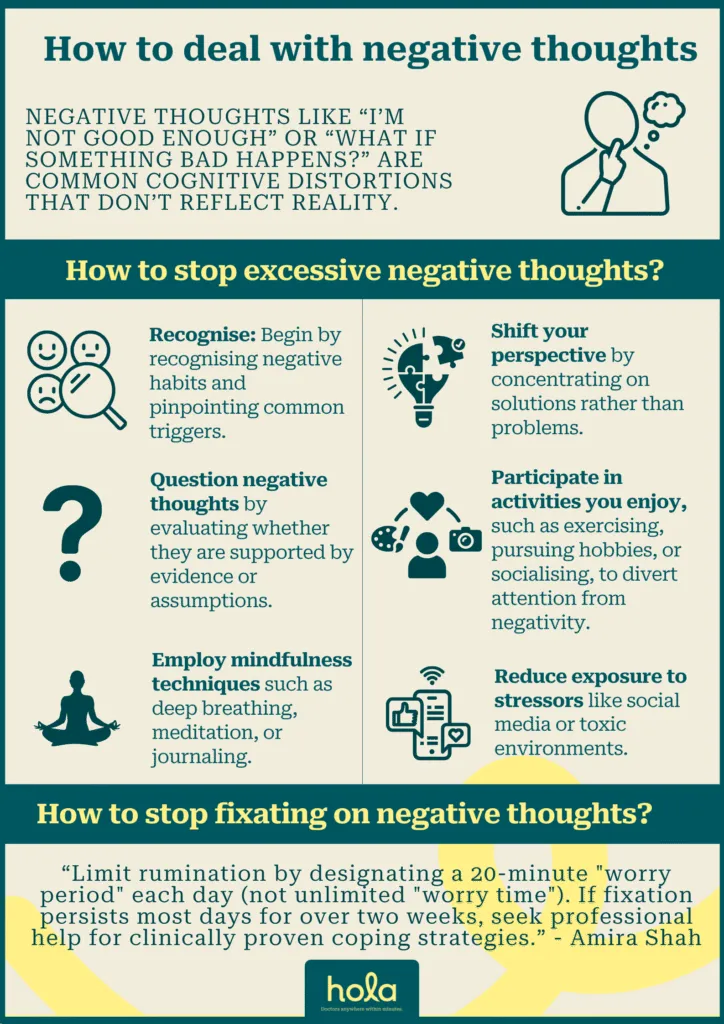How to deal with negative thoughts: Trusted guide by therapists
Written by editorial staff writer at Hola. Medically reviewed by Amira Shah, MA in Counselling Psychology, Registered Psychotherapist.

Contents

Summary: Managing negative thoughts begins with self-awareness. Challenge irrational thoughts using Cognitive restructuring techniques (a core component of CBT). Utilise mindfulness to maintain presence and decrease overthinking. Shift negativity by practicing gratitude and evidence based positive reframing Engage in uplifting pursuits like aerobic exercise (proven to reduce rumination by 26%). If negative thoughts persist for more than two weeks and hinder daily activities, seek professional assistance.
Negative thoughts aren’t they quick to appear out of nowhere? One minute, you’re on top of the world, and the next, you’re drowning in worries or doubts. What many people don’t realize is that the average person experiences about 6000 thoughts per day, with a significant portion being negative- this is normal brain functioning. Sounds familiar? Well, here’s the good news: You don’t have to let those negative thoughts control you. Therapists have some powerful tools to handle them and regain control. Ready to take charge of your mind? Let’s dive into some proven strategies to help you regain a sense of calm.
Examples of negative thoughts
Here are some common examples of negative thoughts that many people experience:- “I’m not good enough.” - This represents “all or nothing thinking, a cognitive distortion where you ignore nuances and see things in extremes.
- “Everyone is judging me.” - known as “mind reading,”, where you assume you know others’ thoughts, without evidence.
- “I’ll never be able to do this.” - this shows “fortune telling,” where you predict negative future outcomes. “Nothing ever goes right for me.” - This is an example of “mental filtering,” where you focus on the negative.
- “What if something bad happens?” - This represents “catastrophising,” - common in anxiety disorders. A fear-driven thought where you envision the worst possible scenarios without any real reason.
- “I’m a failure” - A sweeping negative assertion that overshadows your achievements or success.
- “I’m always making mistakes.” - This thought magnifies errors, making you believe you’re powerless or incapable.
- “I’m too old/young to change.” - This reflects “fixed mindset thinking,” this thought restricts growth by solidifying the belief that change is impossible after a certain age.
Ready to access mental health support? Consult a GP to discuss your eligibility.
Book now
Fully bulk-billed, across Australia.
How do I stop excessive negative thoughts?
Excessive negative thinking can be daunting, but implementing effective strategies can help you regain control of your mindset.- Begin by recognising negative habits and pinpointing common triggers.
- Question negative thoughts by evaluating whether they are supported by evidence or assumptions.
- Employ mindfulness techniques such as deep breathing, meditation, or journaling to remain present and minimise overthinking.
- Shift your perspective by concentrating on solutions rather than problems.
- Participate in activities you enjoy, such as exercising, pursuing hobbies, or socialising, to divert attention from negativity.
- Reduce exposure to stressors like social media or toxic environments.

FAQs
How to stop fixating on negative thoughts?
Amira commented - ‘To escape negative thought patterns, begin by acknowledging their occurrence. Assess irrational thoughts by using cognitive restructuring techniques from CBT (Cognitive Behavioural Therapy) instead of just questioning their validity. Use evidence-based mindfulness practices like the 5-4-3-2-1 grounding technique to remain present. Redirect your focus through activities requiring full sensory engagement rather than passive distractions. Limit rumination by designating a 20-minute "worry period" each day (not unlimited "worry time"). If fixation persists most days for over two weeks, seek professional help for clinically proven coping strategies.’What is the main cause of negative thinking?
Negative thinking frequently arises from past experiences, stress, anxiety, or cognitive distortions like catastrophising or all-or-nothing thinking. Factors such as low self-esteem, perfectionism, and fear of failure can also play a role. External influences, including trauma, unhealthy surroundings, or societal conditioning, may reinforce negative habits. Identifying triggers can aid in managing and reinterpreting thoughts in a more positive light.When to seek help?
If negative thoughts become persistent, overwhelming, or disrupt daily living, it is crucial to seek help. Indicators include trouble focusing, emotional distress, sleep issues, social withdrawal, or heightened anxiety and depression. If negative thinking impacts relationships, work, or self-worth, consulting a therapist, counsellor, or general practitioner can provide support and effective coping techniques. While there is mental health care plans available in Australia, not all are 100% bulk-billed. Coverage depends on individual circumstances and the provider. With Hola Health telehealth service, online mental health care plan is fully bulk billed. Negative thoughts don’t stand a chance when you’re armed with the right tools! By confronting, reframing, and being kind to yourself, you can rewrite the story your mind tells. Take a deep breath, practice mindfulness, and remember you’ve got the power to shift those thoughts and restore your calm. Let’s say goodbye to negativity!Ready to access mental health support? Consult a GP to discuss your eligibility.
Book now
Fully bulk-billed, across Australia.
Providing consult for
- Cough
- Nausea & vomiting
- Fever
- Hayfever
- Fatigue
- Sore throat
- Acne
- Gout
- Eczema
- Rosacea
- Sunburn
- UTI
- Erectile dysfunction
- Contraception
- Morning sickness
- Morning after pill
- Prostate health
- Anxiety
- Depression
- Stress
- Grief & loss
- Premature ejaculation
- Asthma
- Blood pressure
- Diabetes
- Cholesterol
- Migraines & headaches
- Allergies
- Heartburn & reflux
- Sleep disorder
- Gastro
Related Articles
What Is Online Therapy? Everything You Need To Know About e-Therapy
February 19, 2026Mental Health
...
Disclaimer
This blog is for general informational purposes only and does not indicate that Hola Health provides all treatments or preventive measures mentioned. It is not intended to be a substitute for professional medical advice. Always seek the guidance of your doctor or other qualified health professional with any questions you may have regarding your health or a medical condition. For emergencies please immediately contact 000. Any medical topics discussed are intended to educate, not to imply availability through Hola Health.




